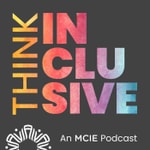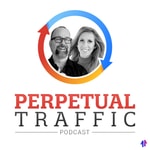Think Inclusive – Details, episodes & analysis
Podcast details
Technical and general information from the podcast's RSS feed.

Think Inclusive
MCIE
Frequency: 1 episode/22d. Total Eps: 210

Hosted on Acast. See acast.com/privacy for more information.
Recent rankings
Latest chart positions across Apple Podcasts and Spotify rankings.
Apple Podcasts
🇺🇸 USA - courses
20/07/2025#87🇨🇦 Canada - courses
12/07/2025#98🇨🇦 Canada - courses
11/07/2025#83🇨🇦 Canada - courses
10/07/2025#51🇨🇦 Canada - courses
09/07/2025#29🇺🇸 USA - courses
27/05/2025#94🇺🇸 USA - courses
26/05/2025#55🇺🇸 USA - courses
24/05/2025#76🇺🇸 USA - courses
23/05/2025#92🇺🇸 USA - courses
21/05/2025#84
Spotify
No recent rankings available
Shared links between episodes and podcasts
Links found in episode descriptions and other podcasts that share them.
See all- https://openai.com/blog/chatgpt
196 shares
- https://www.khanacademy.org/
151 shares
- https://twitter.com/ProudStutter
28 shares
- https://twitter.com/inclusive_pod
18 shares
RSS feed quality and score
Technical evaluation of the podcast's RSS feed quality and structure.
See allScore global : 63%
Publication history
Monthly episode publishing history over the past years.
The Harsh Realities of Segregated Classrooms
Season 12 · Episode 1
jeudi 5 septembre 2024 • Duration 52:57
About the Guest(s):
Tim Villegas is the Director of Communications for the Maryland Coalition for Inclusive Education (MCIE). He is also the founder of Think Inclusive, which is the blog, podcast, and social media handle of MCIE. He has 16 years of experience in public education as a teacher and district support specialist. His focus now is on how media and communications can promote inclusive education for all learners.
Episode Summary:
Dive into the compelling discussion led by Tim Villegas on the prevalent issue of segregated special education classrooms and the significant need for inclusive education. In this inaugural episode of the 12th season of Think Inclusive, Tim reflects on his experiences as a special education teacher and district support specialist, offering profound insights into why segregated classrooms persist and how we can evolve beyond them. He questions the rationale behind segregated education and champions the cause of inclusive practices for all learners, especially those with complex support needs.
Tim dismantles prevalent myths around the safety, specialized support, and individualized attention that segregated classrooms purportedly offer. He also introduces effective strategies and frameworks that underline the benefits of inclusive settings for students' academic and social development. This episode serves as a rich resource for educators, parents, and policymakers committed to fostering equitable and inclusive learning environments.
Complete show notes + transcript: https://mcie.org/think-inclusive/the-harsh-realities-of-segregated-classrooms/
Key Takeaways:
- The Inadequacy of Segregated Classrooms: Segregated special education classrooms often fail to provide the individualized, specialized support they promise, leading to a divided attention on students' needs.
- The Importance of Inclusive Vision: Effective inclusion requires strong leadership from school principals and district administrators, emphasizing a collaborative approach between general and special education teachers.
- Natural Proportions: Distributing students with complex support needs across various classrooms in natural proportions can significantly enhance inclusive practices and provide balanced support.
- Role of School Leadership: School principals play a critical role in shaping inclusive culture and driving systemic change within the education system.
- Effective Collaboration: Success in inclusive education comes from the joint efforts of general and special education teachers, ensuring that services are delivered effectively and equitably without siloing student needs.
Resources:
Maryland Coalition for Inclusive Education (MCIE)
Thank you to our sponsor, IXL! Learn more: https://www.ixl.com/inclusive
Hosted on Acast. See acast.com/privacy for more information.
A Conversation with Inclusionists
Season 12
jeudi 29 août 2024 • Duration 56:54
About the Guest(s):
Margo Gross: Margo serves as the Supervisor of Equity for Calvert County Public Schools. Her work focuses on identifying and dismantling barriers to inclusion within educational environments, advocating for equity, and ensuring that all students have equal opportunities to thrive.
Lisa Quinn: A former special education teacher, Lisa is now the owner and executive director of Reach Every Voice. Her organization focuses on integrating inclusive educational practices and supports that enhance the learning experiences of students with diverse needs.
Jennifer Ayers: Jennifer is an instructional coordinator for special education with Cecil County Public Schools. Her role involves coordinating and implementing inclusive education strategies and supporting educators in providing high-quality education to all students.
Jennifer Sommerness: Jen is a researcher at the Ties Center at the University of Minnesota. She specializes in inclusive education practices and collaborates with educators to develop strategies that support the inclusion of all students in general education settings.
Episode Summary:
In this special live episode of Think Inclusive, host Tim Villegas engages with a distinguished panel about the intricacies and importance of inclusive education. Recorded at the Crown Plaza in Annapolis, the discussion features insights from Margo Gross, Lisa Quinn, Jennifer Ayers, and Jennifer Sommerness, each bringing their extensive experience and expertise in the field.
The panelists delve into what it means to be an inclusionist, exploring the roles and responsibilities involved in advocating for inclusive education. Using personal stories and professional experiences, they provide a holistic view of the challenges and triumphs associated with implementing inclusive practices in educational systems. From identifying and removing barriers to actively listening and engaging in meaningful conversations, the episode emphasizes the collaborative effort needed to foster an inclusive environment.
Listeners will learn about the practical steps and strategies that can be employed to advocate for and achieve inclusive education. The conversation highlights both the successes and ongoing challenges, providing a nuanced perspective on why inclusion is not just the right thing to do, but an essential practice for educational equity and social justice. The episode concludes with a discussion on how to maintain resilience and motivation in the face of setbacks and the importance of community and support in continuing this vital work.
Transcript: https://share.descript.com/view/jOZJVcZxL6G
Key Takeaways:
- Definition and Role of an Inclusionist: Understanding the responsibilities and attributes of those who advocate for inclusive practices in education.
- Importance of Listening: The significance of listening to others' perspectives and experiences in promoting and implementing inclusive education.
- Personal Stories of Inclusion Benefits: Real-life examples of how inclusive education has positively impacted students and educators.
- Challenges and Resilience: Strategies for staying motivated and effective in the fight for inclusion, despite facing resistance and setbacks.
- Collaboration and Continuous Learning: Emphasizing the need for ongoing conversations and efforts to adapt and improve inclusive practices.
Resources:
MCIE: https://www.mcie.org/
Reach Every Voice: https://www.reacheveryvoice.org/
TIES Center at University of Minnesota: https://tiescenter.org/
Hosted on Acast. See acast.com/privacy for more information.
FEED DROP: AMI The Pulse
Season 11
jeudi 6 juin 2024 • Duration 26:13
Think Inclusive is off this week as we prep for the homestretch to season 11.
This week, we have a feed drop for you from our friends at AMI.
It’s called The Pulse.
In this episode: Journalists Amy Silverman and Rebecca Montelion discuss ableism, journalism, and intellectual disability. They explore the importance of plain language in news reporting and the need to include the voices of people with intellectual disabilities themselves. The guests share their experiences working on a pilot project that focused on cognitive accessibility in journalism and highlight the lack of scholarly research in this area. They also discuss the challenges of navigating relationships with caregivers and parents when covering stories about people with intellectual disabilities.
Transcript: https://otter.ai/u/uyq8j83pDlyeEAYJxrRBljRcwo4
Enjoy the feed drop from AMI - The Pulse to learn more about making journalism more inclusive and accessible.
We will see you back in our feed next week.
Hosted on Acast. See acast.com/privacy for more information.
Creating Cultures of Belonging in Education and Beyond with Alida Miranda-Wolff
Season 9 · Episode 15
jeudi 10 mars 2022 • Duration 32:43
About the Guest(s):
Alida Miranda-Wolff is the CEO and founder of Ethos, a consultancy firm specializing in Diversity, Equity, Inclusion, and Belonging (DEIB) transformation. She is notable for her book, "Cultures of Belonging: Building Inclusive Organizations that Last," which explores strategies for fostering inclusive environments. Alida's background spans higher education at the University of Chicago, non-profit work in immigrant and refugee rights, and a pioneering role in venture capital as one of the first Latina directors. She has taught at the University of Chicago, Northwestern University, and General Assembly, cultivating a deep understanding of DEIB initiatives. Through Ethos, Alida aims to innovate and apply DEIB strategies that resonate with modern organizational dynamics.
Episode Summary:
In this insightful episode of the Think Inclusive Podcast, Tim Villegas engages Alida Miranda-Wolff, the CEO of Ethos and author of "Cultures of Belonging," to delve into creating inclusive educational environments. With a focus on diversity, equity, inclusion, and belonging (DEIB), Alida explains how organizations, particularly schools, can foster a culture of belonging for both students and teachers. Tim and Alida discuss how identity and personal experiences shape one's approach to DEIB work, drawing from Alida's diverse career background in higher education, nonprofit, and venture capital sectors.
Throughout the conversation, Alida emphasizes the importance of belonging as a core psychological need and describes her approach to building inclusive cultures, which hinges on the three R's—relationships, resources, and reciprocity. For schools, this means creating meaningful connections and ensuring educators are supported and fairly compensated. Alida also addresses the issue of value misalignment within educational institutions and how teachers can navigate these challenges. Practical strategies for fostering belonging among educators are discussed, encouraging teachers to build their micro-cultures and seek community support, even in misaligned systems.
Transcript: https://c80acee1-5663-46ff-a2d6-b4cf328e0b7f.usrfiles.com/ugd/c80ace_eba009b77530450591e2acbebed753c5.pdf
Key Takeaways:
- Building a culture of belonging requires deep, meaningful relationships, ample resources, and a reciprocal understanding between individuals and the organization.
- Alida Miranda-Wolff's journey from venture capital to DEIB consultancy highlights the need for inclusive practices across all organizational types, including schools.
- For educators, feeling valued and experiencing alignment with their school's mission is essential for sustaining their passion and effectiveness.
- Misalignment of values within educational institutions can drive educators away; however, finding community and shared values within small teams can create a buffer.
- Practical tools and strategies are available for educators to foster inclusion and belonging, even without overarching institutional support.
Resources:
- Alida Miranda-Wolff: https://alidamirandawolff.com/
- Ethos: https://www.ethostalent.com/
- Alida's books: "Cultures of Belonging: Building Inclusive Organizations that Last" and "The First Time Manager: Diversity, Equity, and Inclusion" (available where books are sold)
- MCIE: https://mcie.org/
Hosted on Acast. See acast.com/privacy for more information.
What Inclusionists Need To Know About the Anti-CRT Movement
Season 9 · Episode 14
jeudi 24 février 2022 • Duration 01:20:13
What is Critical Race Theory and what do advocates for inclusive education need to know about the Anti-CRT movement?
For this super-sized episode, we share the story of an inclusive Maryland principal who was pushed out of taking a job as a Diversity, Equity, and Inclusion Director in Cherokee County, Georgia. A devastating side-effect of the backlash against CRT is the damage that has been done to educational equity initiatives. These initiatives are the very ones that inclusive education advocates have been trying to connect the dots from disability rights to equity for all students.
We interview four individuals with experience and expertise in CRT:
- King Williams, a filmmaker, and journalist in Atlanta, GA
- Alida Miranda-Wolff, a professional in the Diversity, Equity, Inclusion, and Belonging sector in Chicago, IL
- Eddie Fergus, a professor at Temple University
- Pete Newlove, a doctoral student at the University of Colorado and current high school English teacher
Transcript: https://c80acee1-5663-46ff-a2d6-b4cf328e0b7f.usrfiles.com/ugd/c80ace_958d58ac9e694664a10707209382131a.pdf
Referenced in the episode:
- Cherokee Schools' would-be diversity administrator shares why she stepped down (Cherokee Tribune & Ledger News)
- Teacher Anti-CRT Bills Coast To Coast: A State By State Guide (Forbes)
- Plessy v. Ferguson (History.com)
- Conservative-led school board fires superintendent after allegations of private ultimatum, teacher protest (Washington Post)
- Gov. Kemp opposes 'Critical Race Theory' in letter to state board of education (11 Alive - Atlanta)
- State Education Board Passes Resolution On Teaching Race (Georgia Public Broadcasting)
- Teachers Say Laws Banning Critical Race Theory Are Putting A Chill On Their Lessons (NPR)
Special thanks to BG AdGroup: http://bgadgroup.com/
Hosted on Acast. See acast.com/privacy for more information.
Diana Pastora Carson | Beyond Awareness
Season 9 · Episode 13
jeudi 10 février 2022 • Duration 35:38
Diana Pastora Carson is the host of the Beyond Awareness Podcast.
Her TedTalk, "Walking with Joaquin," chronicles her family's journey to bring home her brother after living in an institution for 15 years.
She joins us on Think Inclusive to talk about her journey as an educator who advocated for inclusive education, what it’s like now that Joaquin has been home for close to ten years, why she started the Beyond Awareness podcast.
Books
Beyond Awareness: Bringing Disability into Diversity Work in K-12 Schools & Communities
Ed Roberts: Champion of Disability Rights
This episode's transcript can be found here.
Take our podcast listener survey: bit.ly/TIPodcastSurvey.
Visit Think Inclusive for more information about inclusive education.
Have a question or comment? Reach us at [email protected].
Follow us on Facebook, Instagram, and Twitter.
Credits
This podcast is a production of MCIE.
Support the podcast and become a patron of the Think Inclusive Podcast!
Hosted on Acast. See acast.com/privacy for more information.
Greta Harrison | Born Fabulous Podcast
Season 9 · Episode 12
jeudi 27 janvier 2022 • Duration 52:44
Today on the podcast, we welcome Greta Harrison, the host of the Born Fabulous Podcast.
We talk about the reason for starting "Born Fabulous," why hope should be an essential characteristic of an educator, and the goal of inclusion is always life in the community.
This episode's transcript can be found here.
Take our podcast listener survey: bit.ly/TIPodcastSurvey.
Visit Think Inclusive for more information about inclusive education.
Have a question or comment? Reach us at [email protected].
Follow us on Facebook, Instagram, and Twitter.
Credits
This podcast is a production of MCIE.
Support the podcast and become a patron of the Think Inclusive Podcast!
Hosted on Acast. See acast.com/privacy for more information.
The Intersection of Race and Disability | Pop Up Podcast @ #CEC2022
Season 9
vendredi 21 janvier 2022 • Duration 48:56
Happy Friday Inclusionists!
Today we have a special pop-up podcast interview with some folks I met at the CEC Conference in Orlando this week.
They presented a session called, “The Intersection of Race and Disability: Where Do We Go from Here?”
I think it is an important reminder for us that inclusion and equity go together, and that when we are talking about inclusive education, we really mean all students.
Here is a special bonus interview from the Council for Exceptional Children Conference in Orlando, Florida.
CW: the R-word is used in its historical context and in its relation to educational criteria for special education
Guests
Dena Slanda, Ph.D.: [email protected]
Zerek Mayes, Ed.D.: [email protected]
Eric Wells, Ed.D.: [email protected]
Lindsey Pike, MSW: [email protected]
References
Antiracism and Universal Design for Learning by Andratesha Fritzgerald
Cultivating Genius by Gholdy Muhammad
Case Studies on Diversity and Social Justice Education by Paul Gorski & Seema Pothini
This episode's transcript can be found here.
Take our podcast listener survey: bit.ly/TIPodcastSurvey.
Visit Think Inclusive for more information about inclusive education.
Have a question or comment? Reach us at [email protected].
Follow us on Facebook, Instagram, and Twitter.
Credits
This podcast is a production of MCIE.
Support the podcast and become a patron of the Think Inclusive Podcast!
Hosted on Acast. See acast.com/privacy for more information.
Amanda Darrow and Shamby Polychronis | Honoring Intersectionality
Season 9 · Episode 11
jeudi 13 janvier 2022 • Duration 01:03:05
Today on the podcast, we welcome Amanda Darrow (Utah Pride Center) and Shamby Polychronis (University of Utah) to talk about honoring intersectionality between the disability and LGBTQIA+ communities.
We cover a lot of ground including the difference between gender/sexuality/sex, pronouns, stats on people who identify as both LGBTQIA+ and disabled, and ways educators can make classrooms more inclusive for both communities.
Amanda and Shamby also respond to the question, "If kids consume media that has LGBTQIA+ representation, won't they just get confused?"
Referenced in our interview:
This episode's transcript can be found here.
Take our podcast listener survey: bit.ly/TIPodcastSurvey.
Visit Think Inclusive for more information about inclusive education.
Have a question or comment? Reach us at [email protected].
Follow us on Facebook, Instagram, and Twitter.
Credits
This podcast is a production of MCIE.
Support the podcast and become a patron of the Think Inclusive Podcast!
Hosted on Acast. See acast.com/privacy for more information.
The Best of Think Inclusive Volume 2
Season 9 · Episode 10
jeudi 30 décembre 2021 • Duration 45:13
Happy Holidays!
To finish off 2021, we are featuring four interviews. One that you haven't heard yet, Lou Brown, and three that you might have caught in our feed if you've been listening for a while: Katie Novak, Alfie Kohn, Cheryl Jorgensen.
The first is a previously unpublished clip from my 2019 interview with the co-founder of TASH, the late Lou Brown. I always meant to revisit this interview and I'm so glad I did for this episode.
Next up is my interview with universal design for learning expert, Katie Novak. We talk about how ineffective traditional assessments are because they are not universally designed, even though the most recent education law says they should be.
My interview with Alfie Kohn, author of the book punished by rewards, was our most listened to episode of 2021. And the clip you are about to hear is probably one of the reasons why. Alfie, I mean, Mr. Kohn, lays out his argument for why educators should steer clear from using any extrinsic reward system in their classroom.
And finally, I wanted to share my interview with Cheryl Jorgensen, author of many books on the topic of inclusive education. This clip is from 2014 and it is important to me because it shows my growth in an area that I'm rather ashamed it took me so long to realize: the parallel between the civil rights and disability rights movement and how they are inseparable.
Thanks for your time and attention! See you in 2022!
This episode's transcript can be found here.
Take our podcast listener survey: bit.ly/TIPodcastSurvey.
Visit Think Inclusive for more information about inclusive education.
Have a question or comment? Reach us at [email protected].
Follow us on Facebook, Instagram, and Twitter.
Credits
This podcast is a production of MCIE.
Support the podcast and become a patron of the Think Inclusive Podcast!
Hosted on Acast. See acast.com/privacy for more information.









